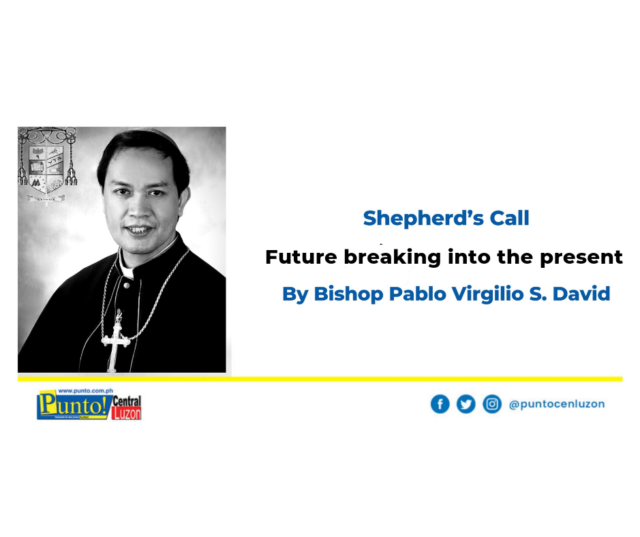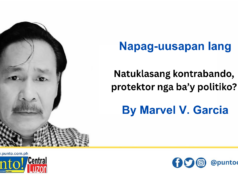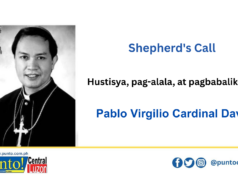THE WORD for future is “hinaharap.” Literally, it means that which is ahead of us, our destination, where we are heading on to. The liturgical season which we begin today gives us a different perspective about the future, not as something that we are going to, but as that which is coming to us. We call it ADVENT. And that is what it literally means: a COMING.
We ritualize this season every year for four weeks by lighting four candles—one per week: three with the dark color of purple, and one with the brighter color of pink which announces the breaking of dawn, the symbol of hope, the color of Gaudete, of rejoicing.
It is important to emphasize that Advent is not yet Christmas. Please have some patience to go through this season of fasting and praying, if we want to truly feel the joy of Christmas soon. Let us not succumb to the commercialization of Christmas. We will celebrate a meaningless Christmas if we do not prepare for it spiritually with the penance of Advent. What LENT is to EASTER is what ADVENT is to CHRISTMAS.
We are called upon by the Church to do two things during this season: to look back and to look forward. TO LOOK BACK at the first coming of the Lord, and TO LOOK FORWARD to his return, or his second coming. When do we do that? In the present time, meaning, NOW. Advent is really about developing a good sense of HISTORY.
Some people have the mistaken notion that history is just about retelling the past. In Tagalog the word for retelling is SALAYSAY. No, history is more than retelling. It is more about giving meaning or making sense of the past in the present so that we can look forward to a future. Making sense in Tagalog is pagbibigay-saysay. That is the root word for history in Tagalog, SAYSAY, meaning. It is what history is all about for us.
There is no sense in looking back to the past except to understand who we are in the present, why we are who we are, why we behave the way we do. There is something very wrong about the attitude of escapism that is prevalent among young people today, especially those who say “The past is past. Let us just forget it and move on or move forward.” It is a good idea but it is wrong. Who wants to get stuck in the past anyway? It is precisely because we do not want our past mistakes to keep repeating themselves that we need to refresh the past properly in our memory. Otherwise, the ghost of the past can continue to haunt us in the present. We remain in that dark and perpetual state of victimhood that deprives us of a future, because we do not know how to review the past in a manner that lights up our path in the present for the future.
We often hear the saying repeated to us as a warning, “Those who do not learn from history are doomed to repeat it.” I think you have already heard me propose a more grim formulation of that statement, “Those who do not learn from history are simply doomed. Period.” (Or those who do not remember properly with dismember.)
I am inclined to believe that one of the greatest contributions of Christianity to humankind is precisely our sense of history. That is why we do a safekeeping of documents in our archives. It is part of our compulsion to preserve both our tangible and intangible heritage in the Church. Without a sense of history we cannot even develop a good sense of identity.
Jesus left us a memorial at the Last Supper which we have kept repeating in the ritual of the Breaking of the Bread because he told us to do so. He said, “Do this in memory of me.” Look, it’s been almost two thousand years since he said so, and here we are, still doing it IN MEMORY OF HIM. We are doing it not just to recall a past event but to make it present all over again. The Advent prayer that goes with every Eucharist is what we keep repeating when the priest asks us to PROCLAIM THE MYSTERY OF FAITH. The simplest proclamation is MARANATHA! Come Lord!
But the more elaborate proclamation is: “We proclaim your death (past), O Lord and profess your resurrection (present) UNTIL YOU COME AGAIN (future).” It is in the Eucharist that we keep refreshing our sense of history by making sense of the past in the present so that we look forward to a future.
Somebody once asked me: “Until when will we keep celebrating the Eucharist?” Meaning “Until when will we keep recalling the last supper in memory of Jesus?” The answer is right there again in the mystery of faith: UNTIL HE COMES AGAIN. He taught us to keep celebrating his redeeming passion and death and resurrection in the present in a manner that consistently looks forward to the coming of its fulfillment, which he calls a RETURN.
In short, Jesus is teaching us to dream of a future but to start its fulfillment already in the present. You cannot have a future doctor or lawyer, or architect in a student of medicine, law or architecture who does not take his studies very seriously in the present. The future will not drop like a pie from the sky. You weave it already in the present, gradually, thread by thread.
Like if we truly want to have a better future for our country, we don’t just wait for it. WE WORK FOR IT. We take part in realizing it. We don’t wait to reach that future. Rather we wait with patience as we work for its realization. Remember, the prayer Jesus taught us does not say “May we reach the kingdom of heaven after our journey on earth.” No. He said, “May your kingdom come on earth as in heaven.” May we learn to live life on earth as if heaven has begun.
For that to happen, we have to develop the virtue of patience, the spiritual intelligence to postpone gratification. We heard Jesus say in the Gospel, “Do not let your hearts be drowsy from carousing and drunkenness and the anxieties of daily life…but be vigilant.”
We have to develop the ability not just to wait for a realization but also to wait on each other, to act, to work, to take part in God’s creative activity. We also have to be able to stop every now and then in order to contemplate God’s work in progress. That is what the writer of the Book of Genesis tells us what God did at creation: “God looked at all that he had done, and he saw that it was good.” That is how you make the future break into the present.
(Homily for the First Sunday of Advent, 28 Nov. 2021, Luke 21:25-28,34-36)





